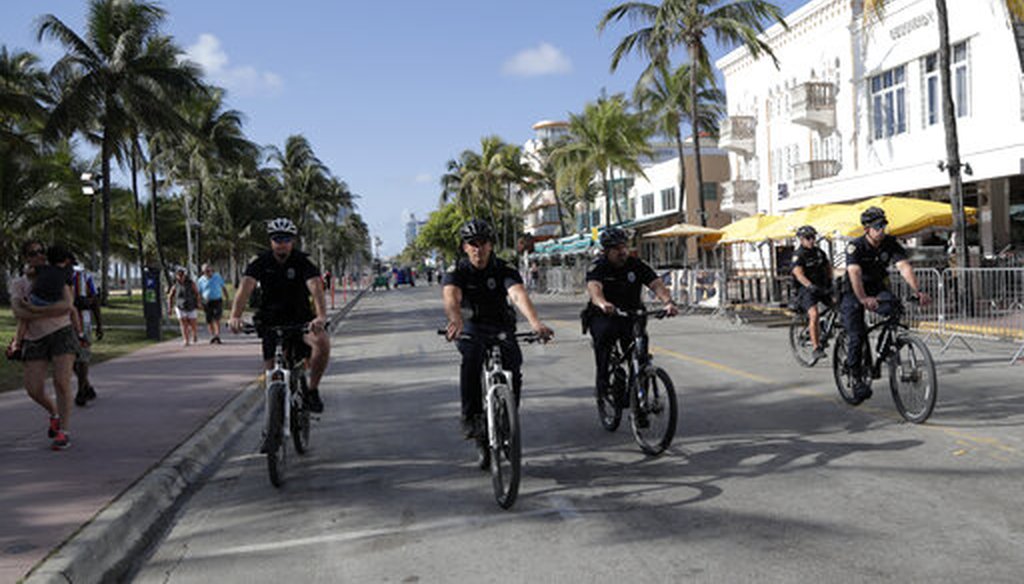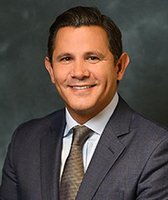Stand up for the facts!
Our only agenda is to publish the truth so you can be an informed participant in democracy.
We need your help.
I would like to contribute

Miami Beach police officers patrol on Ocean Drive March 15, 2020, in Miami Beach, Fla. (AP)
If Your Time is short
-
Health experts say any strategy of letting first responders be exposed to the coronavirus would be misguided and even dangerous.
-
Arriola said that he raised a hypothetical question about first responders and immunity. Arriola said he was referring to the U.K.’s course of action, which early on was different from many other countries.
-
U.K. officials made some statements suggesting that they would avoid lockdowns and hope to achieve herd immunity. Their statements created confusion.
A Miami Beach city commissioner created a stir when he suggested that first responders should try to catch coronavirus so that they will develop immunity.
Commissioner Ricky Arriola said at a March 13 meeting that he was researching whether someone develops immunity after they recover from COVID-19.
"Some doctors have told me yes," Arriola said. "To the extent that that is true, might we start thinking about, dangerous but bold ..."
"Chicken pox," someone else in the commission meeting said.
Arriola continued: " — it’s like chicken pox, thank you — with our first responders voluntarily taking one for the team, going through the two weeks. Guys, we have to be serious about this, and then developing the immunity. It’s our job to think boldly."
A Miami Herald reporter tweeted his comments, and Arriola instantly drew criticism, leading him to try to further explain his idea and state that it would be voluntary.
Arriola told PolitiFact that he wasn’t proposing that first responders should get the virus but raised a hypothetical question and was trying to "think out of the box." He tweeted that his comments related to the approach the U.K. had taken to coronavirus.
Health officials told us that any strategy of letting first responders be exposed to the coronavirus would be misguided and even dangerous.
RELATED: We answered your questions on coronavirus seasonality, immunity and transmission
Police, firefighters and other first responders don’t have the option of working from home and must continue to interact with the public. Medical experts told us it’s a bad idea to try to let these workers become infected.
First "such a plan would not be possible by any established or ethical method" said Dr. Myron Cohen, an expert in Immunology, and Epidemiology at the University of North Carolina School of Medicine.
Second, it’s not clear if COVID-19 will leave those who recover from the disease immune to it in the future. Dr. Melissa Brown, a professor of microbiology/immunology at Northwestern, previously told PolitiFact that long-lasting immunity is not likely because similar respiratory infections will only leave the body with short-lived immunity.
Third, even among first responders who are relatively young, it’s possible some could get a severe case, including any who have underlying conditions.
"It’s not a completely benign disease," said David Hamer, an expert on infectious diseases at Boston University.
Stephen S. Morse, Columbia University professor of epidemiology, said a more effective strategy would be for first responders to use personal protective equipment and test them all periodically.
"The problem is that testing is in short supply, and uses valuable resources, but I think it would be far more practical," he said.
Related: Donald Trump’s wrong claim that ‘anybody’ can get tested for coronavirus
U.K. officials created a flap over theories about herd immunity and their initial response to coronavirus, which differed from some other European countries.
"Herd immunity" or community immunity occurs when a high percentage of a community is immune to a disease — either through vaccines or prior illness — reducing the spread of a disease. It’s not clear what percentage of the population needs to develop immunity after infection or future immunization, but it could be in the range of 60-70%. Since there is no vaccine yet, a strategy of encouraging illness poses risks.
While Italy, France and Spain instituted lockdowns, Prime Minister Boris Johnson initially called for "not taking as many draconian measures" and said that he would not be closing schools or cancelling large events.
Britain’s chief scientific adviser Sir Patrick Vallance said on March 13, "Our aim is to try and reduce the peak, broaden the peak, not suppress it completely. Also, because the vast majority of people get a mild illness, to build up some kind of herd immunity so more people are immune to this disease."
Immediately, scientists pushed back.
Dr. William Hanage, an expert on epidemiology of infectious disease at Harvard, wrote in an op-ed for The Guardian that he thought Britain’s plan was "satire."
"The U.K. should not be trying to create herd immunity, that will take care of itself," he wrote. "Policy should be directed at slowing the outbreak to a (more) manageable rate."
Medical experts in the U.K. told The Atlantic that it wasn’t actually the goal of U.K. officials to spread the coronavirus to lead to herd immunity, but that they botched public communication. The U.K.’s written plan on March 3 didn’t mention herd immunity at all.
"People have misinterpreted the phrase herd immunity as meaning that we’re going to have an epidemic to get people infected," said Graham Medley at the London School of Hygiene and Tropical Medicine.
The U.K. changed course following the March 16 release of a study by the Imperial College COVID-19 Response Team. Experts outlined two different strategies: mitigation, which aims to slow but not necessarily stop the epidemic, and suppression, which aims to reverse epidemic growth.
The experts concluded that mitigation might reduce deaths, but would still likely result in hundreds of thousands of deaths and overwhelm intensive care units. Experts concluded that suppression is the "only viable strategy at the current time. "
On March 16, Johnson announced new measures including recommendations that everyone should work from home if possible and avoid crowded gatherings, including at pubs and restaurants. Johnson said that those with underlying conditions and the elderly should stay at home.
"Herd immunity is not part of our action plan but is a natural by-product of an epidemic," said Alex Gore, a spokesman for the U.K.’s Department of Health and Social Care. "Every measure that we have or will introduce will be based on the best scientific evidence."
Our Sources
Miami Herald reporter Martin Vassolo, Tweet, March 13, 2020
Miami Beach, City Commission meeting (minute 46), March 13, 2020
Sun Sentinel, Miami Beach commissioner asks if first responders should ‘take one for the team’ with coronavirus, March 15, 2020
Vox, The UK backs away from "herd immunity" coronavirus proposal amid blowback, March 15, 2020
Full Fact, Here is the transcript of what Boris Johnson said on This Morning about the new coronavirus, March 10, 2020
The Atlantic, The U.K.’s Coronavirus ‘Herd Immunity’ Debacle, March 16, 2020
CNN, US, UK coronavirus strategies shifted following UK epidemiologists' ominous report, March 17, 2020
The Guardian, Johnson: many more people will lose loved ones to coronavirus, March 12, 2020
The Guardian opinion by Dr William Hanage is a professor of the evolution and epidemiology of infectious disease at Harvard, "I’m an epidemiologist. When I heard about Britain’s ‘herd immunity’ coronavirus plan, I thought it was satire," March 15, 2020
The Conversation by Arindam Basu, Associate Professor, Epidemiology and Environmental Health, University of Canterbury, The ‘herd immunity’ route to fighting coronavirus is unethical and potentially dangerous, March 17, 2020
Science Media Centre, expert comments about herd immunity, March 13, 2020
The Hill, Florida official faces backlash for suggesting first responders 'take one for the team' and get coronavirus to build immunity, March 16, 2020
Association for Professionals in Infection Control and Epidemiology, What is herd immunity? Accessed March 17, 2020
Washington Post, U.K. resists coronavirus lockdowns, goes its own way on response, March 16, 2020
The Independent, Coronavirus: 60% of UK population need to become infected so country can build 'herd immunity', government's chief scientist says, March 13, 2020
BBC, Coronavirus: UK changes course amid death toll fears, March 17, 2020
Imperial College COVID-19 Response Team, Impact of non-pharmaceutical interventions (NPIs) to reduce COVID19 mortality and healthcare demand, March 16, 2020
Metro, Coronavirus UK: Are bars and restaurants closed for 12 weeks? March 17, 2020
Email interview, Miami Beach Commissioner Ricky Arriola, March 16, 2020
Email interview, Stephen S. Morse, Columbia University Professor of Epidemiology, March 18, 2020
Email interview, Myron Cohen, Associate Vice Chancellor for Global Health and Medical Affairs at the University of North Carolina, March 17, 2020
Telephone interview, David Hamer, Boston University professor of global health and medicine, March 17, 2020




































